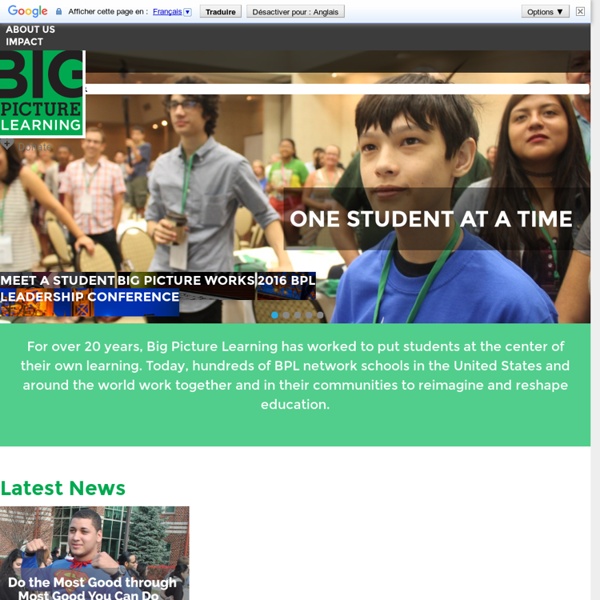



Open Online Learning – A Paradigm Shift Entrepreneurial opportunities in Open Online Learning A new age rushes towards us like an unstoppable tsunami. A global information age, rising from the combined effect of the prior tectonic plate shift inventions of the microchip and internet. It is an age that will usher in the ‘Neo-Renaissance Man’ capable of human capital output many times greater than that of their singularly specialised industrial-age predecessor. This new-age person will come into being by a paradigm shift in education – the full exploitation and engagement of Open Online Learning. Introduction – Open Online Learning
Small schools movement Benefits[edit] Supporters of small schools claim that "in small schools, student achievement increases... Student attendance improves, graduation rates rise, and college going rates increase. Students are more engaged in their studies and are more likely to participate in extracurricular activities." Enstitute, an Alternative to College for a Digital Elite Ms. Gao decided that she didn’t want to continue studying at Baruch College, part of the City University of New York. At first she considered transferring to Carnegie Mellon in Pittsburgh, but she changed her mind when she saw that her tuition bill would be around $44,000 a year, with only a small amount of financial aid available. “I didn’t want to come out of college with $200,000 in debt and have to spend 10 years paying it off,” she said. Yet she still sought a way to nurture her interest in technology.
Academies: School Within a School College and career prep are fully integrated in academies that give students a wide range of options after high school. Credit: Ethan Pines Dave Hackett is a master of illusion. The juniors in his science class at the Manufacturing Production Technology Academy (MPTA) of Laguna Creek High School, in Elk Grove, California, are too busy launching and chasing the rockets they made in class to notice they're actually learning physics. Hackett's class is part of a high school innovation movement known as career academies.
Nine Dangerous Things You Learned In School We live in an exciting and interesting time — one when some of our most commonly accepted ideas, traditions and principals are being challenged. This past week featured a fascinating read in the Wall Street Journal asking “Are Playgrounds Too Safe?”, making the case that “ decades of dumbed-down playgrounds, fueled by fears of litigation, concerns about injury and worrywart helicopter parents, have led to cookie-cutter equipment that offers little thrill.” The result being children less compelled to play outside, potentially stunting emotional and physical development and exacerbating a nationwide epidemic of childhood obesity.
Small Schools Workshop Size is one determining characteristic of a small school, yet small schools are about much more than size. In contrast to large, factory-model schools, small schools can create a more intimate learning environment that is better able to address the needs of each student and teacher. Students, teachers, and parents may all be better served when a school is small enough to allow for effective communication amongst educators, students and the school community. In small schools, meaningful relationships are fostered and opportunities for collaboration are cultivated.
Elizabeth Weil’s case against emotional regulation: Schools are making kids conformist and boring. Photo by Remy Gabalda/AFP/Getty Images A powerful essay by Elizabeth Weil in the New Republic posits that “American Schools Are Failing Nonconformist Kids.” Weil examines the growing role that "emotional regulation"—an educational tool pioneered by the KIPP charter school network and also known as self-regulation, grit, motivation, discipline—is playing in classroom management, as teachers try to keep order and foster learning. The new ideal student, she says, is a compliant “good citizen” who keeps her head down and who “doesn’t externalize problems or talk too much or challenge the rules too frequently or move around excessively or complain about the curriculum or have passionate outbursts.” Katy Waldman is a Slate assistant editor.
The School-Within-a-School Model In an age of reform and restructuring, educators are seeking new models to improve their schools. One approach is to replicate the qualities, and hopefully the advantages, of a small school by creating a "school-within-a-school." This approach establishes within the school a smaller educational unit with a separate educational program, its own staff and students, and its own budget. Several cities, including New York City, Philadelphia, and Chicago, have experimented with this as a method for downsizing (Raywid, 1995). This Digest briefly introduces the school-within-a-school concept, summarizes existing research on school-within-a-school models, and reviews some of the advantages and disadvantages. Downsizing and the School-Within-a-School Model
A New Educational Model — Teaching & Learning Salman Khan has received global notoriety for his videos on Khan Academy which have kicked off a discussion about how to leverage online learning within education. However, most of the press I see misunderstands his philosophy which is laid out in his new book "The One World School House: Education Reimagined." While technology plays a key role in attaining global reach, this is just a small part of his vision for the future. He understands the difficulty of changing large systems and so he hasn't written a manifesto.
Schools-Within-Schools Model Seen Yielding Trade-Offs Published Online: September 18, 2007 Published in Print: September 19, 2007, as Schools-Within-Schools Model Seen Yielding Trade-Offs The idea that many U.S. high schools are too large and impersonal to serve students well has gained considerable credence in research and policy circles. But starting over from scratch with thousands of small, stand-alone high schools is also often seen as expensive and impractical.
Teach for America’s Deep Bench “Is this our Egypt moment? Will we seize the moment?” Former New York City schools chancellor Joel Klein spoke those words at Teach for America’s 20th anniversary summit last summer. Coming from Klein, who is now a divisional leader at Rupert Murdoch’s News Corp, incitements to political uprising might raise some eyebrows.